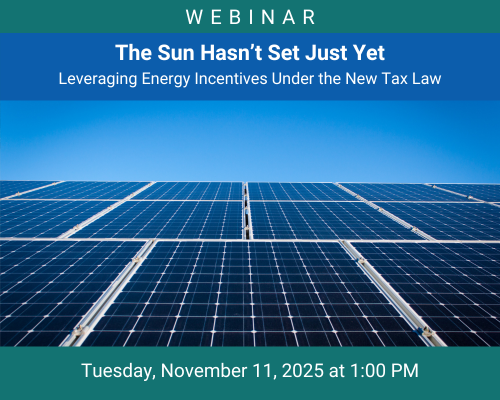
The Sun Hasn’t Set Just Yet: Leveraging Energy Incentives Under the New Tax Law
The passage of the One, Big Beautiful Bill Act (OB3) has had a major impact on energy-efficient tax incentives for commercial real estate. In this session we’ll explore four different incentives, delving into how the thoughtful taxpayer can still leverage benefit despite impending sunset dates. A focus on timely, proactive strategy will be emphasized throughout.
We’ll begin with the 179D Deduction, and review current standards, calculation procedures, and documentation. We’ll also consider the deduction allocation process used to transfer the deduction to a design professional where appropriate.
Next, we’ll touch on the 45L Credit, focusing on the major procedural changes required to successfully claim the incentive before the OB3 sunset date. Then we’ll consider the major changes the OB3 brings to the Clean Electricity Investment Credit (CEIC), affecting renewable solar and wind systems. Finally, we’ll explore the Alternative Fuel Vehicle Refueling Property Credit (30C) under the OB3.
Learning Objectives
· List the crucial sunset dates in play under the OB3 and understand how they are interpreted for each incentive
· Describe the historical lability of energy incentives, recognizing that they frequently phase-out and are renewed
· Understand the impact of the Prevailing Wage and Apprenticeship Requirements
· Become familiar with the benefit, timing, eligibility, and documentation requirements associated with the 179D Deduction, the 45L Credit, the ITC/CEIC, and the 30C Alternative Fuel Vehicle Refueling Credit under the OB3
Course Outline
- EPAct 179D Deduction
- Standards
- Calculation
- Documentation
- OB3 Sunset
- Section 45L
- Investment Tax Credit / Clean Energy Investment Credit
- Alternative Fuel Vehicle Refueling Property Credit / Electric Vehicle Recharging Credit /30C
- Advocacy Efforts
CPE Credit
MGI North America members in the U.S. will earn 1.0 CPE credit for attending the entire webinar, answering live polls, and completing the Evaluation Form.
Level: Beginner/Intermediate
Prerequisites: General Background in Accounting, Depreciation and Cost Segregation
Advanced Preparation: None
Field of Study: Taxes
Speaker
If there’s one thing Bill Harbeson of Capstan knows, it’s construction. He started by installing HVAC after high school, spent years in construction management, and smoothly transitioned to tax consulting with a construction focus. Bill attributes part of his success to the sheer volume of Energy Studies he’s overseen in the last decade – he’s seen every scenario, addressed every nuance, and left no dollar behind. But more than that, Bill believes in a client-centric approach, striving to create the positive service experiences that taxpayers – and tax professionals — deserve.
Experience
- Has overseen 1000s of EPAct 179D Studies, yielding over $1B in tax savings for his clients
- Extensive process experience with a focus on compliance, quality assurance, and audit readiness
- Managed a large team of energy professionals, providing all tax and technical onboarding
- Strong construction background allows him to speak the “language” of industry professionals, helping him better understand their needs
Speaker

William Harbeson
When
Date: Tuesday, November 11, 2025
Time: 1:00 PM – 2:00 PM ET
Where
Link to Zoom provided after registration




